I’ve had a rough four or five days. I went all the way to the edge of the sublime Simien Mountains, one of the top sights in all of Africa—and never saw them.

You know, someone is going to see this and realize that Sofa Juice would make a great name for their indie rock band and when Sofa Juice is headlining a world tour will I get any thanks? No. Life sucks.
Chronologically:
At my hotel in Bahir Dar I thought I was just being my normal cheery, chatty self with the ever-smiling receptionist—until her little brother started calling me “Uncle”. I changed hotels the next morning. Besides, I can’t get involved with a girl who handles filthy Ethiopian banknotes all day. Don’t get me started on the prevalence of yeast infections among bank tellers. As Ron Burgundy would say, “It’s science.”
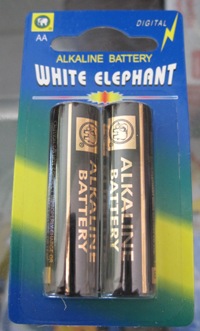
Made in China. Their English always makes me feel better.
To leave Bahir Dar I went to the bus station (a dirt lot) where I was besieged by touts. A tout is someone who is trying to get you to buy a service or product. In the travelers case it’s a hotel, bus, restaurant, tour or guide service. These touts hang outside the gates demanding to know your destination so they can lead you to a particular bus where they will get the highest commission when they overcharge you. I know this, and yet I was ready to throttle one guy who followed me around like a jilted lover with nothing better to do than make sure I didn’t pay the local price with anyone else.
The other reason bus touts hound people is simply to fill the bus up so they can go. I can’t see the logic of buses not leaving until they’re full, because I always see people on the edge of town or out in the sticks trying to get on with no luck.
Gonder is about 200km north of Bahir Dar. It’s OK, but lacks Bahir Dar’s ideal lakeside setting. When I got to town I was again a magnet for guys trying to “help” me. I verbally lashed out at them, but I thought about it and took a different tack because I don’t want it to be my main memory of a place. Instead I simply stopped to talk and joke with them and now I am on good terms with all of Gonder’s touts. I may have gone too far the other way as now at least half a dozen guys—kids, really—yell, “America!” when they see me, and they always see me.
I asked one of them, “Why aren’t you in school?” and the kid says in disbelief at the stupid question, “I’m hustling!” as if anything else could be as important.
If I was (were?) Ethiopian, I would be a tout. Making money from tourists has to be the easiest way to survive.
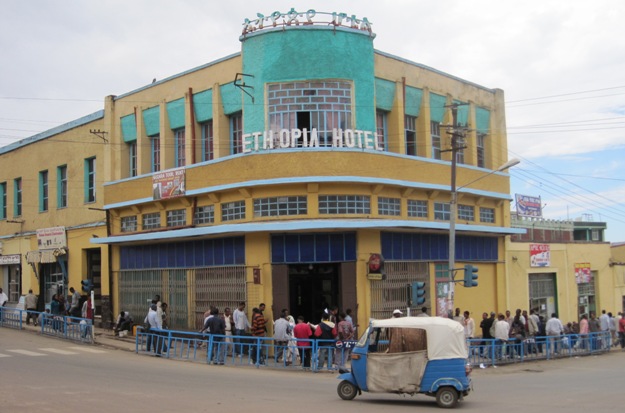
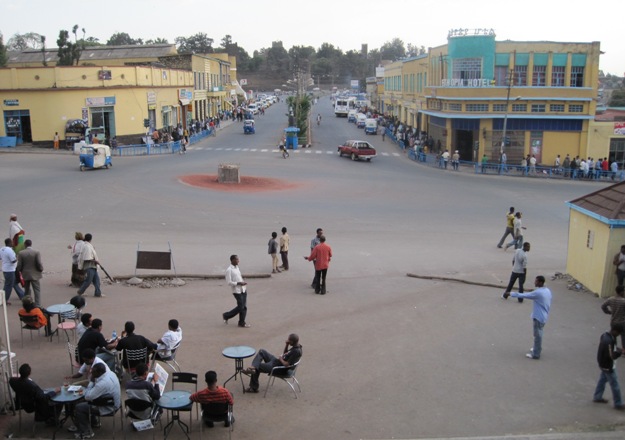
A view of the 'piassa' from the Gonder post office
I come this way to head to the town of Debark, 100km north, for the trip into the Simien Mountains. To prepare I loaded up at the only ATM in town that accepts international cards and bought dry goods like tuna and nuts that was said to be more expensive or nonexistent in Debark (How can a town of 40,000 not have much in the way of food? I soon found out.)
I knew this stretch of road would be slow as it’s part of the last section of the Northern Route loop that has yet to be paved, but I didn’t expect more than five hours to go 100km (62 miles?). More than five hours! How long can you handle bus rides that take more than five hours to go 100km How many times can you do that? How many? It was brutal. I was ready to hang myself. Typical was the long delay before we even got out of town. It was explained to me as a “technical problem” that turned out to be the bus driver forgetting his driver’s license.
By the time we arrived I was a doddering, quivering fool covered from head to toe in a thick film of dusty grit. And then I discovered that Debark only rarely has electricity and even rarer is water. Lovely.
I am aware that my complaining is falling on very deaf ears among my fellow travelers, especially the ones before me who have glossed over the last few sentences because they are saying to themselves, “Wait, did he say there are ATM machines in Ethiopia now?” and “Did I just read correctly that there are parts of the Northern Route that are paved now? What is this idiot whingeing about again?”
At the unique land Scape hotel I’m open-minded enough to try roasted lamp, but not shiro feses:


Whatever. It’s good preparation for hiking in the mountains. I went down to park headquarters and got all the info I needed, and then woke up sick the next morning and haven’t been healthy since. It feels like a flu of some sort. I don’t know what it is or how to get better. I get dizzy walking up stairs, like my brain is about to hemorrhage. I never know what medicine to take. In my toiletry bag I have an impressive collection of pharmaceuticals from around the world: Thai ibuprofen (I think it is ibuprofen), Japanese pain killers, French hay fever pills, German valerian root, and some homeopathic stuff my friend Lisa gave me. I left the Philippine antibiotics at home this time.
I thought of waiting for my condition to improve in Debark, but I couldn’t envision getting better there. Food was limited, just spaghetti and local food. Normally I have a very impressive capability to eat the same food for days and days on end, and for the last two weeks I have had nothing but local food save once or twice, but I wanted something else and Debark didn’t have anything. Debark supposedly has 40,000 inhabitants, but it’s really a one-road town that has tons of people living in far-off settlements.
For two long days I stayed in Debark, a sloshy mud pit of a town when the afternoon rains come. The third day I thought I might be OK to make at least a day trip into the park if I could latch on to another group heading in, but I was gassed walking to the park headquarters on the edge of town and the group never materialized.
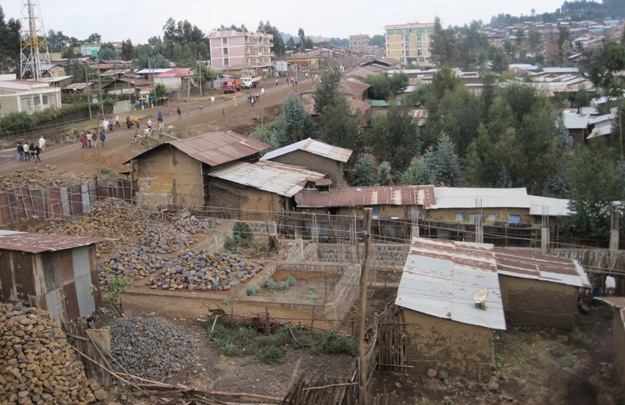
The view of Debark from my hotel. It looks better the farther away you are. At the lower right note the satellite dish on top of the mud hut with the corrugated metal roof. Ethiopian TV will cut off local programming to broadcast Champions League soccer games live, so it makes sense, right?
My plan was to keep heading north to Axum, 200km away, but it’s the same dirt road in worse shape and if you don’t want to risk trying to get a seat on the only bus that originates in Gonder, you have to pay someone to sit on the bus for those hours and then take their seat. (That’s a hell of a way for a local to make money. I wonder what that job title is called.)
I decided to head back to Gonder on what became an equally horrendous journey. I had arguably the best seat on the bus, the front seat, but it was still miserable and my legs were cramped. This time it rained and I thought it would keep the dust down, but it meant that we slipped and slid going up and down hills. I’m sick of the same old music on my mp3 player and sick of traveling alone on these wretched bus rides. I tried to focus on the scenic countryside. I see things I don’t often see elsewhere, such as twice I saw a procession carrying a cadaver over their heads on a woven rack, an umbrella shading the head.
I see people in the countryside run to the street to try and get the bus to stop, which rarely happens unless the bus driver knows them. A missed bus isn’t the end of the world, but it’s disheartening to see their faces when they get passed. Rural people get the shaft every time.
It looks like the Chinese are the ones paving the road. You have to give them credit, even if it is purely a business decision in exchange for a natural resource. Who else was going to step in and do it? The Chinese have been clumsy and heavy-handed in dealing with local workers in such projects across Africa, but they will learn.
You know the next step? Allowing the little Asian-made white utility trucks into the country duty free. There are 82 million people in this country, the second most populous in Africa after Nigeria, and very, very few private cars. What reason could there be other than high tariffs to import them? To protect what local industry? Public transport? There’s not enough of a supply of buses in the country and the city, anyway, which are all Japanese already. What am I missing? Must be political. Whomever the transport minister is should be forced to ride the Gonder-Debark bus back and forth until his head is screwed on right.
My friend Greg in Japan, a guy who sees how cheap used cars go for firsthand, and I talk about this all the time. These simple, low-emission tiny trucks cost almost nothing to buy and ship, and it would profoundly change the lives of anyone who had one. What is the argument against it? We shouldn’t be burning even more fossil fuels? Suddenly we are drawing the line at stunting Ethiopia’s growth? It’s patronizing to say Ethiopians shouldn’t have the same opportunities as everyone else in the wasteful first world.
I don’t think Ethiopians are too poor to buy them. They can pool their money together so everyone has a stake in its use and care. Besides, it would be entertaining to watch someone actually pay for one; the largest banknote in Ethiopia is 100 birr, which is a little less than $7.
Think how efficient you could then be and how much time would be freed up to do something else (like starting a mobile cart, cut fruit business a la Thailand. Ethiopians love fruit juices. It’s a natural extension that they would pay for cut fruit. Just another free business idea from The Selfless Dromomaniac.)
These bus rides are so slow I analyze transport economics for hours.
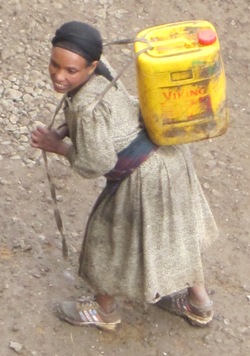
Last week I read in an Ethiopian newspaper about the government crowing that more and more Ethiopians have access to water these days. “Access to water” was defined as being within 500 meters of where you live. Is the bar really so low? Even so, I’ve passed through villages where women sit glumly next to their yellow plastic five-gallon jugs as they wait in long lines for water and countless times have I seen women hunched over with these heavy tanks on their backs.
Debark has 40,000 people, many very near water taps, but in my three nights there was no water and only electricity for a few hours, so how should we measure progress?
Women are always the ones with the heavy loads. I see men sitting around all day long while the women work. I could be wrong, but I think I see more barefoot children carrying stuff to and fro than I do men. I don’t get it.
I forgot the wise words that a traveler told me the other day, something to the effect of, “If there is hot water or anything else that is in irregular supply, don’t assume it is there later. Use/get it right away.”
This dovetails nicely with my friend Caleb’s point about the biggest difference with being in Europe vs. Africa. When you turn on the tap in Europe, there is no question about the result, and that certainty— I forget the rest. Did I mention I am sick? Check out his website.

I keep thinking to change hotels, but I'm apprehensive about the check-in procedure (and do Aryans pay half price?) By the way, in 16 days in Ethiopia, I have slept in 11 different beds. I don't sleep well.
Well, I checked into the Belegez Hotel, making sure they had hot water (people working in hotels tend to tell me what I want to hear), and had to go eat something healthy and run errands. So when I came back tonight and the water was only a trickle—after four days of wearing and sleeping in the same filthy clothes—I yelled at the shower head, “No! NOOOOOO! You can’t do this to me!” as if in the preliminary stage of a nervous breakdown until it occurred to me that everyone in the courtyard can hear my ranting.
I might just hunker down in my room and check out late tomorrow.

Yah, you’re finally in a part of the world that I undrstand and can comment on again! I wish yuo’d go back to india so I can gripe about that some more… except I wouldn’t actually wish that on anyone, especially you in your state. Hey, there’s a thought, it could be worse… in india!
I feel for you man, sorry I haven’t been in touch. Didn’t realize it was getting so bad! You’re right, being sick alone sucks royally. Really hope you’re getting better.
Yeah, the totes in east Africa are some of the worst. Not as persistent and stubborn as India, but then in India you never worry about them getting violent. At least twice in Tanzania it got bad enough that I realized the guy was going to swing, and I was just waiting for it. They didn’t but it was pretty intense. Do be careful in kenya especially, they’re not boys anymore, and they react VERY poorly to any slight disrespect (though god only knows how they manage to think they’re respectable!). Joking and being cool is probably the best bet whenever you can manage it.
Kenya and Tanzania have pretty good roads on the main routes, and Rwanda is paved like America! But in western Tanzania I spent 2 weeks covering 1000 km at an average of 22km an hour. I feel your pain.
Thanks for the blog plug man! although it was a FB status where i talked about the water. 🙂 “The greatest pleasure of returning from the developing world is not the hot shower,price tags on everything,or the flowers smelling stronger than the sewage..it’s taking a glass,turning on the tap,letting the water flow in straight from who-knows-where,and guzzling it..with the absolute certainty that it won’t send your insides on an ivory rollar-coaster.Life doesn’t get much better than that moment.”
Hope you can find Chris! He’s good company and pretty hard to phaze.
Hi there,
I am going to Ethiopia in Nov and doing some reaserch about the country and places worthseeing/advantures, which doesnt mean popular turists destinations. I definitely want to do 3-5 trekking in Simien Mountains, but I must get a decent price. One of the recommended guide on forum emailed me and proposed $700 per person for 5 days! Crazzzzy, I don’t mind paying for a service, it is part of the deal, I travel to let locals earn, but I don’t like being ripped off! I come accross with posts of people who organized the hike at the Park Office. Can you share with me the price they proposed to you, pls? I ll be traveling in group of 2, but we dont mind joining the group of another 2-4 guys.
Thanks in advance,
Karolina
I get emails like this all the time–and I answer them, but as a private email since I doubt few people want to know such minutia…or?
Personally, I absolutely love reading the minutiæ. (yes! I found it! the æ letter on the Mac!)
you clearly know nothing about development africa. the chinese are building roads across east africa. How dare you say “how else is going to step up and do it?”. are you implying that african cannot do it?
And why are there no private cars? because they are imported and therefore very expensive. Africa has great public transportation. Just because it isn’t as reliable as wazungu expect, doesn’t mean its not great. the african way is a lot better for the environment than the American way. Your editorializing is misled.
Bob, if they could do it, why haven’t they done it?
There’s no reason for an imported used car to be expensive. It is the taxes that make it so.
Isn’t reliability a factor in a country having “great public transportation”?